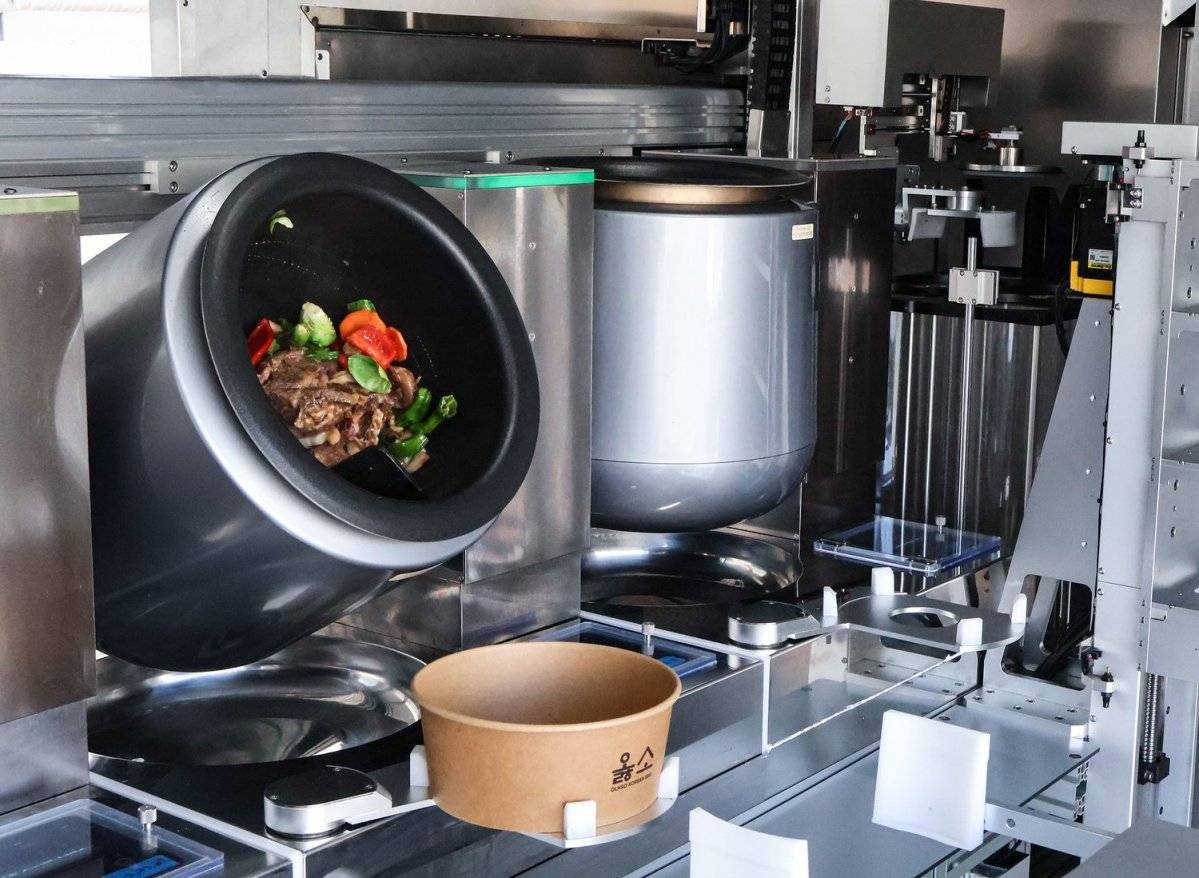A few years ago, the Bay area was the go-to place if you wanted to eat at a robotic restaurant. Whether your meal of choice is burgers (Creator), bowl food (Mezli or Eatsa), or pizza (Zume), chances are if you wanted food made by a high-tech, venture-funded robot, you were in the right place. Fast-forward to today, however, and all of these companies have shut down.
So, where do you go if you’re looking to get a robot meal in what was once the nascent robot restaurant capital of America? If the founders of Shin Starr have any say in the matter, the answer is you stay where you are.
Based in South Korea, the company is operating two fully automated robotic kitchens housed in their mobile Olhso Korean BBQ & Seafood food trucks in the Bay area. If you’d like to order a meal from Olhso, you can download the app and order a meal delivered to your home or office.
The Birth of an Idea
The inspiration behind Shin Starr stemmed from the co-founders’ desire to blend the tradition of Korean barbecue with robotics. The two founders—Jay Shin, a long-time technology investment portfolio manager,and Kish Shin, who previously managed the US franchises for one of the largest Korean barbecue franchises in the country in Kang Ho Dong Baekjeong—got together in 2019 and started working on building a company that would utilize robotics to reduce labor costs and make authentic Korean cuisine.
“We wanted to create something unique and sustainable,” Jay Shin told The Spoon in a recent interview. “Kish and I saw an opportunity to introduce Korean barbecue to the U.S. market in a way that leveraged robotics to enhance efficiency and scalability.”
The Olhso Korean BBQ & Seafood Food Truck
After five years of development, Shin Starr introduced its first Olhso Korean BBQ & Seafood food truck in May of this year. These trucks, which currently operate in Foster City, are outfitted with robotic woks, known as “auto-woks,” that prepare and assemble meals with minimal human intervention. Shin says the only human employee required is a driver, as the robotic kitchen handles the rest, ensuring that meals are served hot and fresh, timed perfectly through a smartphone app.
“Our trucks are very simple,” says Shin. “There’s only one worker, which is a driver, who is also the store manager. The robotic kitchen does everything else.”
The menu features four dishes, including galbi short ribs and kimchi shrimp with pork belly, with prices ranging from $25 to $55, catering to customers looking for a premium street food experience.
According to Shin, the company has filed for nine patents and has five issued so far.
Moving Beyond Trucks
Shin Starr’s ambitions extend well beyond food trucks. The company plans to open a flagship restaurant in downtown San Mateo by November 2024. This 5,000—to 6,000-square-foot restaurant will incorporate the company’s robotic kitchen technology, particularly for preparing side dishes, while still employing human staff for other aspects of the operation.
In addition, Shin Starr is working on a vending machine version of its robotic kitchen, which it plans to launch by mid-2025. This version will target high-traffic locations such as airports and corporate campuses.
Lego-Block Modularity From The Get-Go
Shin says what sets Shin Starr’s robots apart is their modularity. The company has developed its own robotic refrigeration units, cooking devices, and dispensing systems, which can be assembled to create various kitchen setups. This innovative system has already attracted the attention of major players like Samsung, which has ordered 31 robotic systems for its cafeterias following a successful trial.
“From the beginning, we took a modular approach,” Shin explains. “It’s like Lego blocks—each piece can be integrated to form different kitchen setups, allowing us to adapt to various needs and environments.”
Samsung Takes Notice
Shin Starr’s robotic kitchen technology has caught the attention of major corporations, including Samsung. According to Shin, after a successful trial at Samsung’s headquarters in South Korea, where four robotic systems were initially installed, the tech giant has placed an order for 31 additional units to be deployed across its campuses. These robotic kitchens are designed to operate within corporate cafeterias, preparing meals for Samsung’s workforce.
Market Potential and Future Outlook
With an average ticket price of an eye-popping $90 per order, Shin Starr hopes to position itself as a premium brand in the food robotics space. The company’s focus is on building its own consumer-facing brand, but it is also considering franchising its Olhso trucks, vending machines, and brick-and-mortar restaurants.
If you’re in the Bay area and are craving some good Korean fare, download the app and try the Olhso truck. If you do, let us know what you think.

